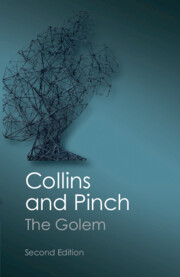Book contents
- Frontmatter
- Dedication
- Contents
- Preface to second edition
- Preface to first Canto edition
- Preface and acknowledgements
- Introduction: the golem
- 1 Edible knowledge: the chemical transfer of memory
- 2 Two experiments that ‘proved’ the theory of relativity
- 3 The sun in a test tube: the story of cold fusion 5
- 4 The germs of dissent: Louis Pasteur and the origins of life
- 5 A new window on the universe: the non-detection of gravitational radiation
- 6 The sex life of the whiptail lizard
- 7 Set the controls for the heart of the sun: the strange story of the missing solar neutrinos
- Conclusion: putting the golem to work
- Afterword: Golem and the scientists
- References and further reading
- Index
4 - The germs of dissent: Louis Pasteur and the origins of life
Published online by Cambridge University Press: 05 February 2014
- Frontmatter
- Dedication
- Contents
- Preface to second edition
- Preface to first Canto edition
- Preface and acknowledgements
- Introduction: the golem
- 1 Edible knowledge: the chemical transfer of memory
- 2 Two experiments that ‘proved’ the theory of relativity
- 3 The sun in a test tube: the story of cold fusion 5
- 4 The germs of dissent: Louis Pasteur and the origins of life
- 5 A new window on the universe: the non-detection of gravitational radiation
- 6 The sex life of the whiptail lizard
- 7 Set the controls for the heart of the sun: the strange story of the missing solar neutrinos
- Conclusion: putting the golem to work
- Afterword: Golem and the scientists
- References and further reading
- Index
Summary
Spontaneous generation
‘Spontaneous generation’ is the name given to the doctrine that, under the right circumstances, life can form from dead matter. In a sense, nearly all of us believe in spontaneous generation, because we believe that life grew out of the primeval chemical slime covering the newly formed earth. This, however, is taken to be something that happened slowly, by chance, and once only in the history of the earth; it ought never to be seen in our lifetimes.
The question of the origin of life is, of course, as old as thought but, in the latter half of the nineteenth century, the debate raged within the scientific community. Could new life arise from sterile matter over and over again, in a few minutes or hours? When a flask of nutrients goes mouldy, is it because it has become contaminated with existing life forms which spread and multiply, or is it that life springs anew each time within the rich source of sustenance? It was a controversial issue, especially in nineteenth-century France because it touched upon deeply rooted religious and political sensibilities.
Our modern understanding of biochemistry, biology and the theory of evolution is founded on the idea that, aside from the peculiar conditions of pre-history, life can only arise from life. Like so many of our widespread scientific beliefs we tend to think that the modern view was formed rapidly and decisively; with a few brilliant experiments conducted in the 1860s, Louis Pasteur speedily defeated outright those who believed in spontaneous generation.
- Type
- Chapter
- Information
- The GolemWhat You Should Know About Science, pp. 79 - 90Publisher: Cambridge University PressPrint publication year: 2012

